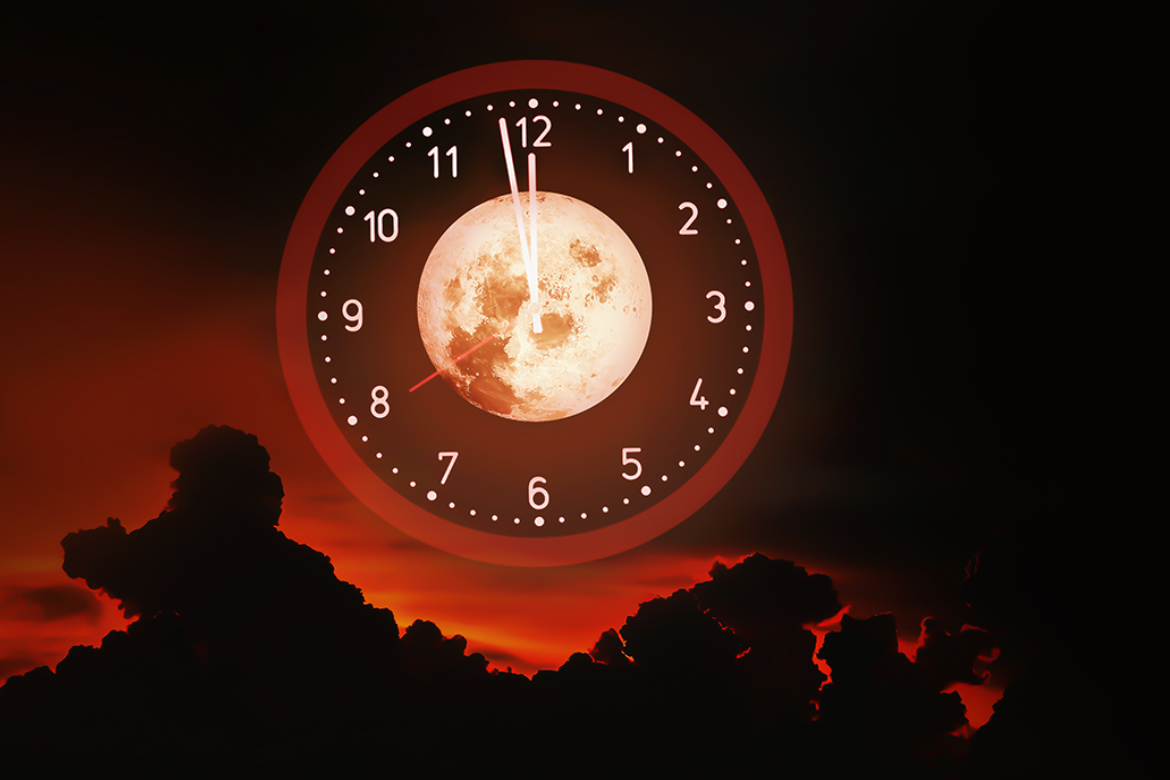The Rebbe once repeated some of the verses from the Tikkun Chatzot and then noted how much these prayers awaken the heart!
The time for Tikkun Chatzot is six hours after nightfall, regardless of the season (see Magen Avraham, Orach Chaim 1:2; 233:1). For example, in North America, Chatzot in the winter would be around 11:30p.m.; in the summer about 3:30 a.m. In more northerly lands, such as England and Northern Europe, in the winter it might be 10:30 p.m.; in the summer, there may not be any Chatzot at all. (In which case a person should try to rise before daybreak; Rebbe Nachman’s Wisdom #301).
We’ve already said that the object of Tikkun Chatzot is to mourn our loss of the Holy Temple and all the troubles that have befallen us ever since. It is customary to recite the prayer in the manner of a mourner, hence there are those who remove their shoes and sit on the floor, others who wear sackcloth, and so on. When asked about this, my Rosh Yeshivah said, “It is more important to wake up to recite the Chatzot prayer and concentrate on the words, than to concern oneself with the additional customs associated with it.”
As for the prayers themselves, their contents are very inspiring. Reb Noson writes: The Rebbe once repeated some of the verses from the Tikkun Chatzot and then noted how much these prayers awaken the heart. He greatly praised a certain part of the liturgy, saying that it had the power to inspire a person to serve God (Rebbe Nachman’s Wisdom #268). Furthermore, the Rebbe said: By saying Tikkun Chatzot, a person finds that he can express his feelings freely, as if he were having hitbodedut (secluded prayer). Mainly, a person recites Chatzot not so much for the past destruction of the Holy Temple, but for what is actually happening to him right now. If a person merits to say Chatzot in this manner, he will find that whatever happens to him appears within these words of the Tikkun Chatzot (Likutey Moharan II, 101).
“It is more important to wake up to recite the Chatzot prayer and concentrate on the words, than to concern oneself with the additional customs associated with it.”
Rebbe Nachman teaches: When reciting Tikkun Chatzot and other similar prayers, apply the verses to yourself. This is especially true of the Psalms. King David wrote Psalms for all of Israel; for the nation as a whole and for each and every individual. The verses are designed in such a way that a person can find in them all his struggles against the Evil Inclination and all the disturbing thoughts and lusts that dominate a person’s life. The enemies that King David seeks to vanquish are the “forces of evil” that surround a person and attempt to deny him the path of life. Prayer is the only weapon that can counter these forces (Likutey Moharan II, 101).

Jerusalem is the heart…
“O God! Nations entered Your Nachalah (Inheritance); they have defiled Your Heichal (Sanctuary), they have put Jerusalem to waste” (Psalms 79:1). This verse is recited as part of the Tikkun Chatzot. From the Kabbalah and the Chassidic teachings, we find that nachalah is symbolic of the Temple – the Da’at; heichal is the mouth; and Jerusalem is the heart. Thus, my Rosh Yeshivah would interpret this verse as follows: “A Jewish mind, the temple, should contain the Talmud: Bavli and Yerushalmi, Midrash, Zohar, Shulchan Arukh, etc. Instead, we occupy our thoughts with the ‘wisdoms’ of the nations. A Jewish mouth, the heichal, should be uttering praises of God, reciting words of Torah and prayer, and speaking words of kindness and encouragement to our family and friends. Instead, we busy our tongues with slander and mockery. A Jewish heart, Jerusalem (the holy city), should be full of love and fear of God. Instead, we have laid it to waste…” This is an example of how we can “translate” and apply Chatzot to our current personal life situation.
Besides, everyone experiences difficult moments in life. There are no exceptions. Because it is a most heartrending expression of suffering and anguish, the Chatzot prayer is a perfect vehicle for releasing one’s own tormented feelings. After Rebbe Nachman passed away, Reb Noson found it impossible to express his agony over the loss. Only when reciting the Chatzot prayer was he able to find consolation (Rabbi Eliyahu Chaim Rosen).
(Taken from the book Crossing the Narrow Bridge: A Practical Guide to Rebbe Nachman’s Teachings – chapter 8: Prayer)

